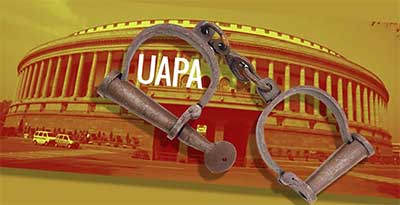Relevance: GS-3: Security Challenges and their Management in Border Areas - Linkages of Organized Crime with Terrorism
Key Phrases: Citizenship (Amendment) Act of 2019, terrorist act, Terrorist Act, Innocent until Proven Guilty
Why in News?
- Recently, an accused in “the Delhi riots cases” who was charged under the Unlawful Activities (Prevention) Act (UAPA), 1967 was denied bail by a Sessions Court in Delhi. He was involved in a protest against the Citizenship (Amendment) Act of 2019.
About Unlawful Activities (Prevention) Act:
- The UAPA, an upgrade on the Terrorist and Disruptive Activities (Prevention) Act TADA (lapsed in 1995) and the Prevention of Terrorism Act – POTA (repealed in 2004) was passed in the year 1967
- It aims at effective prevention of unlawful activities associations in India.
- Till 2004, “unlawful” activities referred to actions related to secession and cession of territory.
- The 2004 amendment, added “terrorist act” to the list of offences.
- Under the act, the investigating agency can file a charge sheet in maximum 180 days after the arrests and the duration can be extended further after intimating the court.
- Powers to Union Government: If Centre deems an activity as unlawful then it may, by way of an Official Gazette, declare it so.
- It has death penalty and life imprisonment as highest punishments.
2019 Amendment of UAPA
- The act was amended to designate individuals as terrorists on
certain grounds provided in the Act.
- Earlier only organizations could be declared as such
- Not designating individuals as terrorists, would give them an opportunity to circumvent the law and regroup under different name
- It empowers the Director General of NIA to grant approval of seizure
or attachment of property when the case is investigated by NIA
- Earlier it required the consent of State Police which delayed the process
- It empowers the officers of the NIA, of the rank of Inspector or
above, to investigate cases of terrorism
- This will help solve the human resource crunch in the NIA.
Controversial Provisions:
- The definition of terrorism in Section 15 of the law is broad and encompassing, encompassing practically every type of violent conduct, political or non-political.
- The police have the authority under sections 43A and 43B to search, seize, and arrest anybody engaging in illegal activity without a warrant.
- With the court’s consent, the police can remove the accused from judicial custody and place him in police custody.
- The accused does not have the option of anticipatory bail under UAPA. It presumes the accused guilty simply based on the evidence gathered.
Criticism of UAPA
- Experiences of Anti-terror laws in India such as POTA and TADA reveals that they are often misused and abused.
- An individual cannot be called a ‘terrorist’ prior to conviction in a court of law, it subverts the principle of “innocent until proven guilty”. A wrongful designation will cause irreparable damage to a person’s reputation, career and livelihood.
- The law could also be used against political opponents and civil society activists who speak against the government and brand them as “terrorists.”
- Critics argue that the law, especially after 2019 amendment gives unfettered powers to investigating agencies.
- Some experts feel that it is against the federal structure, given that ‘Police’ is a state subject under 7th schedule of Indian Constitution.
Critics of provisions of UAPA cite the following as examples of misuse of the Act:
- Recent crackdown on Jamia Millia Students
- Cases filed against the social activists Rona Wilson Varavara Rao, Arun Ferreira, Sudha Bharadwaj and Gautam Navlakha in the 2018 Bhima Koregaon violence
- The arrest of Peasants’ leader Akhil Gogoi
- The arrest of Sharjeel Imam
- The arrest of Kashmiri Photojournalist Masrat Zahra
- Arrest of Anand Teltumbde and Gautam Navlakha
Way Forward:
- Undoubtedly there is a need for stringent laws that show ‘zero tolerance’ towards terrorism but the government should also be mindful of its obligations to preserve fundamental rights while enacting legislation on the subject.
- Drawing the line between individual freedom and state obligation to provide security is a case of classical dilemma. It is up to the officers to ensure professional integrity, follow the principle of objectivity and avoid any misuse.
- There is a greater role for judiciary here to carefully examine the cases of alleged misuse. Arbitrariness under the law should be checked through Judicial review.
Sources: Economic-Times EPW
Mains Question:
Q. Critically analyze the Unlawful Activities Prevention Act (UAPA) in light of the recent amendments and its use in present times with suitable examples?







